
Dumpster Permits
When You Need One and How to Get It

What Is a Dumpster Permit?
A dumpster permit is a document issued by a city or county to a resident or contractor who wants to rent a roll off dumpster. Whether or not you need a permit — and the type of permit required — varies by municipality and where you plan to keep your dumpster while you work.
Common Permit Names
Just like permit requirements vary by town, the name of the permit you need can vary too.
Some of the more common permit names are:
• Street Closing Permit
• Lane Closure Permit
• Street Use/Temporary Use Permit
• Dumpster Permit
• Right-of-Way Permit
• Encroachment Permit
When Do I Need a Dumpster Permit?
If Your Dumpster Will Block the Street or Sidewalk
Keeping your roll off dumpster in the street or on the sidewalk are the most common reasons you may need a permit. This is particularly true if your bin will block a public right-of-way.
Even a 10 yard dumpster can be a hazard to motorists, obstruct vision or interfere with work done by city road crews. A dumpster placement permit ensures city officials are aware of the temporary on-street placement and holds the resident or contractor accountable for any rules or regulations that aren’t followed.
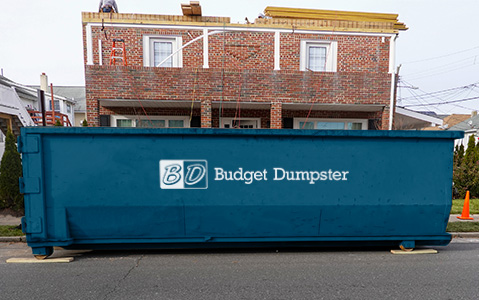
In certain situations, you may not need a permit to keep your bin in a public right-of-way. But you might need to notify the local administration building or police department. Your local government office will let you know which permit you need, if any, and who you need to speak to.
When you call to order, one of our expert team members will help you choose the best place to deliver your roll off dumpster. If your town doesn’t allow street placement, or you want to avoid filling out a dumpster permit application, we’ll work with you to find a way to place your dumpster on private property.
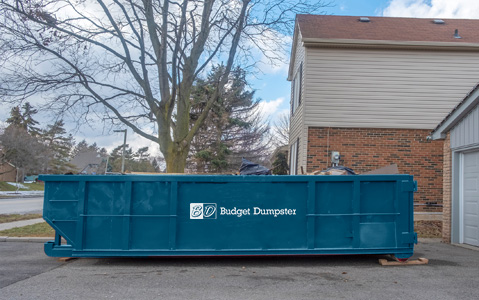
If You’re Keeping Your Bin in Your Driveway
It’s not common, but some cities have dumpster placement laws about parking your bin on private property, such as your driveway. If that’s the case, you may need a dumpster permit even if your bin isn’t encroaching on a sidewalk or public street.
If You’re Part of a Homeowners Association
A homeowners association, or HOA, enforces rules and bylaws for members living in a self-governed neighborhood, condo community or co-op. They may have certain permits or restrictions related to roll off dumpsters, even if the municipality doesn’t. If you live in a community governed by an HOA, you must abide by its terms and fees.
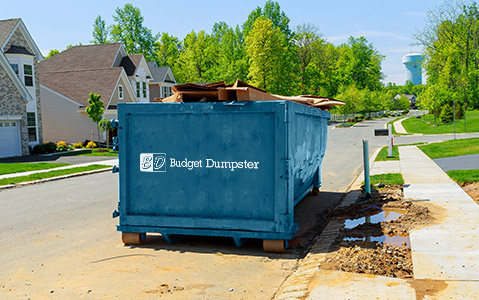
How Do I Apply for a Dumpster Permit?
Some cities make it easier to find what you're looking for than others. Here are a few methods to search for a dumpster permit application.

Check the Website of Your City or Town
Most local government websites have a page that lists available permits. First, see if your town’s website has a “How Do I?” tab at the top. An “Apply for permit” link may be there.
Other websites list permits on department pages. Check the pages for the Public Works, Building, Zoning, Planning and Development, or Street departments. If the website has a search bar, try searching for terms like “dumpster,” “dumpster permit,” “right-of-way” or “permits.”
Start With Budget Dumpster
We want to save you time on your project, so whenever possible, we've tried to find the correct permit or department to contact for you! Search your zip code and check out the Frequently Asked Questions for your town to see if we already have a link to the required dumpster permit in your area.
Find More Detailed Permit Information in Your Area
Contact Your Municipality
If you can’t find a dumpster permit application online, the next best option is to call your local government office. The department that handles permits varies from city to city, but some common departments include:
- Clerk’s Office
- Public Works Department
- Building Department
- Zoning Department
- Planning and Development Department
- Street Department
- Police Department
Calling your local government gives you the opportunity to ask questions and get the most detailed information. You can also discuss options with local officials if street placement isn’t allowed.

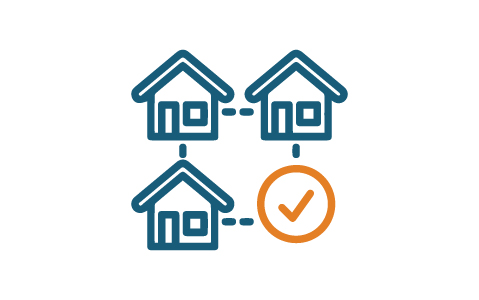
Contact Your HOA
Finding the contact info for your HOA isn’t always a simple task. Unless you already have it handy, you’ll have to do some digging. Search your community’s name or subdivision through your county recorder’s office or the state division of corporations. The name should be on your property deed or mortgage.
You're looking for your HOA’s declaration of Covenants, Conditions and Restrictions, or CC&R. These documents should include your HOA board's location and contact information, as well as any bylaws and restrictions.
If you’re still having trouble finding what you need, try calling your real estate agent or title company to get the info.
Reach Out to Budget Dumpster
Our team has extensive experience working in the communities we serve. While we can’t issue the dumpster placement permit you need, we'll let you know if you need a permit, the type of permit you need and how you can get one. Call us at 833-554-4499 to speak to a member of our team.
Some local governments require the dumpster rental service to get the permit instead of the homeowner. We’ll let you know when you order your roll off dumpster if applying for a permit is your responsibility or ours.
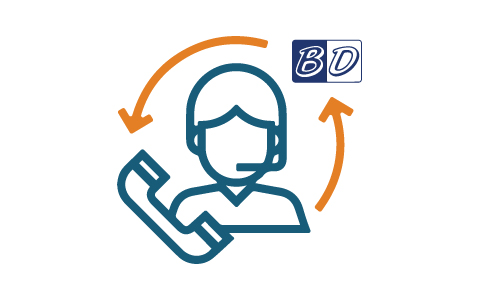
When Should I Get My Dumpster Permit?
You will need any necessary permits after you’ve ordered your dumpster rental, but before it’s delivered. Be sure to factor approval time into your cleanup project timeline. Processing times vary between cities. We recommend applying for a permit at least one week before your scheduled delivery date. While most applications take a day to be approved, it may take time to enforce no parking zones and create space on the street for your dumpster.
In some cities, we may need a copy of your permit or the permit number to finalize your order. Our team member will let you know if this is the case. If it is, be sure to reach out right away with your permit information to prevent any service delays.
If you have questions about where to place your dumpster, give our team a call. Our dumpster rental experts will walk you through the process and help you select the best spot for your roll off container.
Frequently Asked Questions About Dumpster Permits
How much does a dumpster permit cost?
Fees for dumpster permits vary depending on the type of project and how long you need your dumpster. Costs also vary by town but are usually less than $200.
Do you need a permit for a dumpster?
If your city's municipal code requires a dumpster placement permit, then you will need one before we can deliver your rental. A permit allows you to A) Use property that isn't your own, or B) keep a dumpster in your driveway, provided you meet certain requirements.
Keeping your bin in the street may lead to blocking parking spots and/or a lane closure, which requires resources from the city to manage. So, some cities require you to have a permit for a dumpster on the street. The permit is an agreement between you and the city to minimize public inconvenience while working in the right-of-way.
Do I need a permit for a dumpster in my driveway?
Sometimes. There are towns that require residents to get a permit before having a roll off dumpster delivered to their driveway. In cases where you’re keeping the dumpster in your driveway or other private property, the city or Homeowners Association wants to verify that it’s only a temporary additional structure on the property. They may also want to verify the purpose of the dumpster rental, since it could be tied to other projects that require building permits
How long can you have a dumpster in your driveway?
This varies from city to city. Even if you don’t need a permit to keep a bin in your driveway, your city may still have dumpster placement laws to follow, including how long you can keep it. Time limits range from a few days to a month in most areas. Our average rental period is seven to 10 days.
Can I put a dumpster in the street?
That depends on your town’s ordinance or the rules set by your Homeowners Association. Budget Dumpster can deliver a bin to the street, provided the customer has any necessary permit ahead of time. If you need a dumpster permit for street placement and don’t have it when we arrive, the driver won’t deliver your bin and you’ll be charged a fee. Please note that we can’t drop off a dumpster if the street is at a steep incline.
How long can a dumpster be in the street?
Each municipality is different. Time restrictions on a dumpster permit vary depending on the location and the type of work you’re doing. Typically, time limits range from a few days to a month. The average rental period for our customers is seven to 10 days.
What information do I need to apply for a permit?
Your government office may ask for the rental period dates, a traffic control plan (if needed) and project information. You may also need to provide a diagram that shows where the roll off dumpster will be placed.
Does a dumpster permit have any special requirements?
Depending on the city, you will need to abide by any time limit restrictions for your dumpster rental, even if it’s placed in your driveway. Some other common requirements include:
- Covering your dumpster when it’s not actively in use.
- Using reflective tape, cones and No Parking signs in the street.
- Maintaining maximum distances from intersections or sidewalks.
- Taping a copy of your permit to the bin.
Be sure to follow any dumpster placement laws outlined in the permit. Not doing so could result in the city forcing you to stop work or remove the dumpster altogether.
What happens if I don’t have a permit?
If you don’t have the necessary permit at the time of delivery, the driver might decide not to drop off the bin and you’ll be charged a trip fee from Budget Dumpster. If it is delivered and you don’t have the required permit, your city could cite you and order the bin removed. If Budget Dumpster has to move your roll off dumpster and you are at fault, you will get a trip fee.
Have Questions About Dumpster Permits in Your Area?
Budget Dumpster will help you figure out what you need and how to get it.